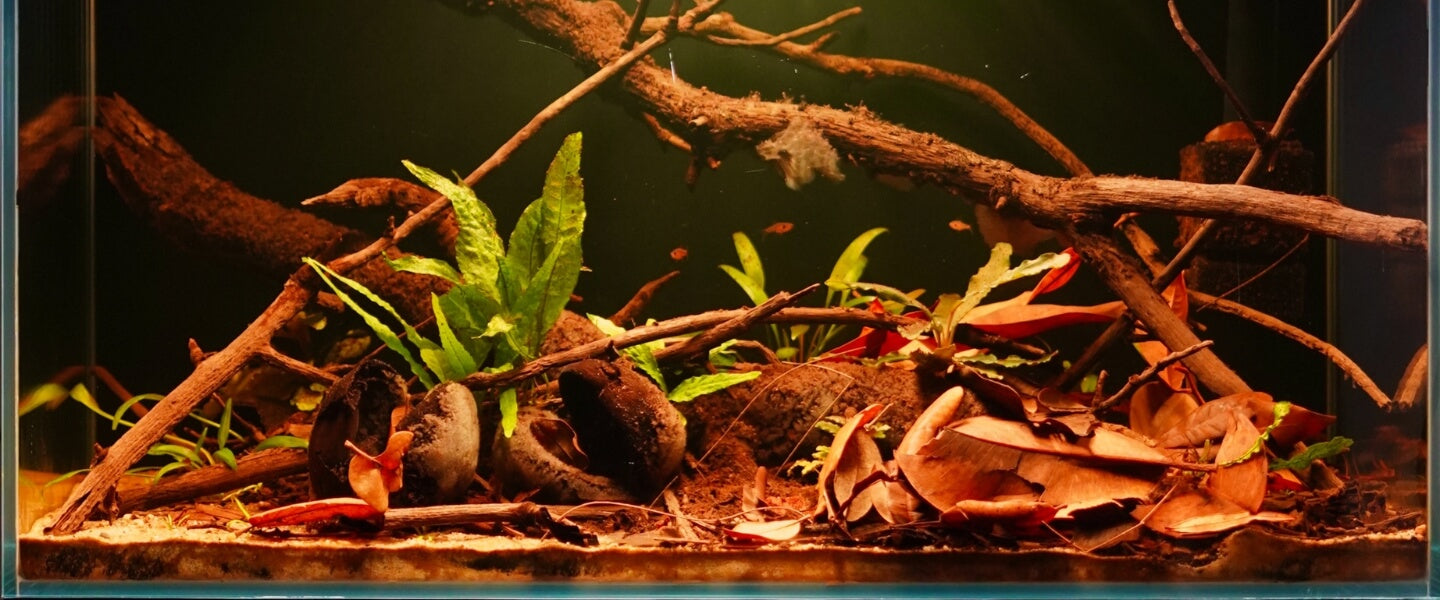A Step-by-Step Blackwater Aquarium Cleaning Guide
Regardless of your fish-keeping method, almost all aquariums require maintenance. Your new botanical method aquarium or blackwater aquarium is up and running, but when it comes time to clean - where do you start? Should you vacuum the botanical substrate? What do you do about algae and biofilms? When should you add new botanicals? How much water should you be changing? There are many practices that you can incorporate into your regular tank maintenance routine to help keep your blackwater aquarium clean. Today we’re talking all things blackwater aquarium cleaning, from preparing blackwater to dechlorinator and everything in between!

Water Changes in a Blackwater Aquarium
For many fish keepers, regular water changes are the most important part of aquarium maintenance. Most aquarists recommend changing 10-20% of your aquarium water weekly to control levels of nitrates, excess nutrients, or growth hormones produced by growing fish in the system. Of course, this value fluctuates depending on your fish-keeping method; for example, heavily planted and Walstad Method aquariums usually require less-frequent water changes due to the number of plants that absorb nutrients, like nitrates. We recommend weekly water changes for blackwater aquariums, there is no difference when compared to a standard aquarium. Don’t forget to add your favorite water conditioner and any additional tannins or fertilizers that may need to be topped off after a change. We are always a fan of Seachem Prime.
Adding Fresh Botanicals to a Blackwater Aquarium
You can add fresh botanicals to your tank at any time. But during a water exchange is our favorite time to build up the botanical substrate in a blackwater or botanical method aquarium. Frequent water changes help an aquarium run clear over time – they remove tannins in the water. But if you want to maintain the golden, tea-stained appearance, add fresh botanicals and “tannin tea” to your tank after your water change. For more information about preparing botanicals for your botanical method or blackwater aquarium, check our botanical preparation instructions!
Are Water Changes for Blackwater Aquariums Special?
The process of cleaning your blackwater aquarium is the same as one with standard aquarium gravel. However, the process of preparing water is different. Blackwater aquariums have acidic pHs, meaning <7, and often run consistently below 6.0. If you were to add in standard tap water with all its minerals (like calcium, carbonates, magnesium, and potassium) the pH will become less acidic and this will stress out your fish. Many species of wild bettas evolved in blackwater habitats, and these habitats have incredibly stable water parameters. Mimicking this in the aquarium can only be achieved through the use of RO water or RODI water which creates a more pure form of water through high-tech filters, I’ll spare you the science behind it. Basically, RO water can be influenced by the tannic acids of aquarium botanicals and helps to create a stable, low pH environment for your blackwater aquarium. Our Blackwater Aquarium blog post goes more in depth.

Cleaning Algae in a Blackwater Aquarium
Algae, biofilms, and other harmless growths are a normal part of a healthy, active ecosystem. However, not everyone loves that look – especially when algae blooms take over the front panel of your tank and obstruct the view! While we recommend leaving the biofilms on either the side or back panels of the glass, feel free to clean the front of your aquarium. But remember that we leave these films there because they are a food source for the aquarium, just like you’d find in a blackwater habitat in Sumatra or Brazil. You can clean your aquarium glass by hand or with a magnetic cleaner designed to remove algae and other films.

How to Clean the Filter Sponges of Blackwater Aquariums
In most aquariums, the filter is the heart of the ecosystem, but in blackwater aquariums, the ecosystem in the tank is the filter. In standard aquariums, much of the beneficial bacteria that keep your aquarium stable lives in the filter, and that sponge is an ideal location for detritus to collect and subsequently clog reducing its flow. Cleaning your filter sponge regularly is important. Restoring the flow of the filter is one of the most important parts of cleaning a blackwater aquarium. The best way to clean your sponge is by gently squeezing it in a bucket of tank water during your weekly water exchange. This should loosen and remove physical detritus, broken leaves, and plant matter from the sponge while preserving the bacteria colonies. Never rinse your sponge under untreated tap water!

Stay Observant, Stay Curious
One of the simplest but most critical things you can do to maintain a healthy blackwater aquarium is to stay observant. Your fish, plants, inverts, and other tank inhabitants will indicate if something is off. Are your plants melting or dying off? Are your fish lethargic or hanging near the top or bottom of your tank? If so, test with your favorite water testing kit and do a water change accordingly. A common question we receive at Betta Botanicals is, “How do I test my water when it’s tinted?”. In our experience, liquid tests do a poor job of providing a concrete number. TL;DR, if the reagent changes color, the parameter you measured is present, and take note. Either the nitrate reagent stays yellow, or it turns some hue of orange, or in the worst case, it turns some red hue. The ambiguity between orange and tangerine is hard to distinguish. When testing water in a blackwater aquarium you kind of need to keep that in mind, if the reagents turn a color away from zero, then you know you have some level of nitrate and you may want to think about a water change soon (but we rarely have nitrates in blackwater aquariums, that’s a different blog post entirely).
Check the Temperature of your Blackwater Aquarium
Many fish in the hobby are tropical, they require warm and stable temperatures to be happy and healthy (think betta fish). If your fish are exhibiting unusual behaviors, checking your water temperature is a great first step. If you’re like me, you know that heaters can randomly die on you if you’re not paying attention and if you don’t have a thermometer, many pet stores, fish stores, and online shops carry affordable thermometers for aquariums and terrariums.

Pro Tips: We love glass thermometers that float in the aquarium and have a suction cup. They are easy to read and when the suction cups subsequently fail, you don’t have to reach your whole arm into the aquarium. We also love to keep a backup heater in our fish bin, just in case the heater goes ca-put.
Leave the Blackwater Aquarium... alone!!!!
The most important rule of thumb can sound a little counteractive – leave it be! Try to avoid deep-cleaning your blackwater aquarium to prevent disturbing the ecosystem. Most of your ‘good stuff’ - the beneficial bacteria and biofilms - live in the botanical substrate you’ve created. Deep-cleaning your substrate (with a gravel vacuum, for example) can disrupt the balance of your ecosystem. Remember - consistency is key. One of the most important things you can do is be consistent with your blackwater aquarium maintenance. Your fish, plants, and other ecosystem inhabitants rely on a stable environment. Dramatic shifts in water chemistry, temperature, and other factors can stress your fish.

Cleaning a Blackwater Aquarium isn't as Scary as you Thought
Cleaning a botanical blackwater aquarium doesn’t have to be scary! For the most part, keep up with regular aquarium maintenance, and otherwise – leave it be! As we mentioned earlier, keep up with weekly water exchanges, don’t touch the substrate, keep those filter sponges clean, and (if its a true blackwater aquarium) keep conditioning that RO water with botanicals in your prep bucket. If you don’t have a blackwater aquarium or botanical method aquarium, but you are looking to get started, Betta Botanicals is happy to support you on your ecosystem-building journey, every step of the way. All of our aquarium botanicals are blackwater safe. Happy fishkeeping, and keep it tinted!








Inspire your friends:
Aquarium Hobbyist Holiday Gift Guide!
Wild Versus Domestic Betta Fish Care & Husbandry
3 comments
I’m interested in an article on why we rarely have nitrates in a Blackwater aquarium. That’s what I’m finding in my tank and there are no plants exporting it.
Great speech, I wish you will contribute more to the community. It is great to have your articles, these are so useful. https://aquatalkies.com/
Great speech, I wish you will contribute more to the community. It is great to have your articles, these are so useful. https://aquatalkies.com/